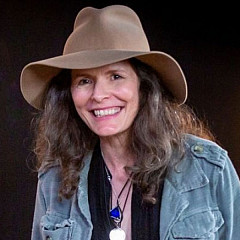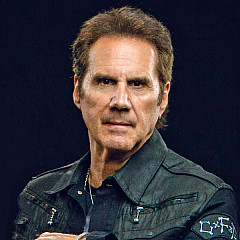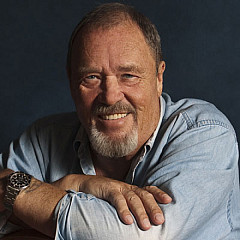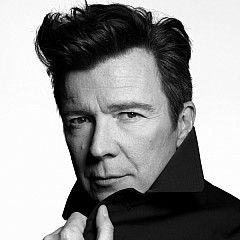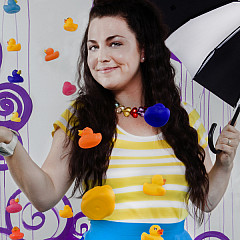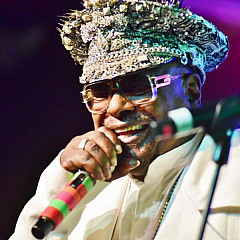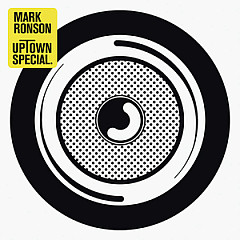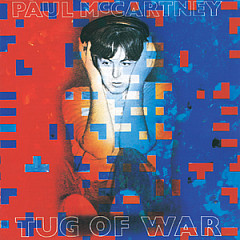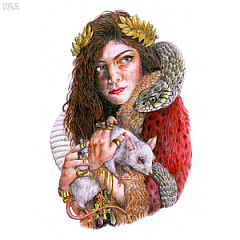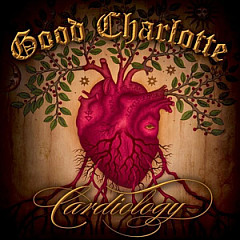 Otep Shamaya is an interviewer's dream - offer up a question, and away she goes. But that said, it's not just an artist flaunting herself in an egotistical manner, but rather, speaking in an honest and open fashion. In fact, from some of her views below, I was reminded of when artists such as Kurt Cobain were bold enough to talk about their political and social standpoints - without concern as to what others thought or how it could affect their career from a "business standpoint."
Otep Shamaya is an interviewer's dream - offer up a question, and away she goes. But that said, it's not just an artist flaunting herself in an egotistical manner, but rather, speaking in an honest and open fashion. In fact, from some of her views below, I was reminded of when artists such as Kurt Cobain were bold enough to talk about their political and social standpoints - without concern as to what others thought or how it could affect their career from a "business standpoint."Otep has been fronting her namesake band since 2000; on April 15, 2016 they release their seventh studio album overall, Generation Doom, produced by hit-maker Howard Benson. Amidst a barrage of rage rock, it contains a surprise cover of a certain modern-day pop hit.
Shamaya spoke with Songfacts a few weeks before the release of Generation Doom, which sounds like it just may be her most personal release - especially from a lyrical standpoint - yet.
Otep Shamaya: "Zero" is a lot of fun. I get to start the record off by setting the foundation of, "I don't give a fuck." I haven't. I just want to remind everybody that I don't. [Laughs]
Also, it brings in some of the things that I care about: animal agriculture, climate change. I know a lot of people get very defensive when you talk about those things out in the open. I'm a moral vegan. It's funny, I get more hate mail from being a moral vegan than I do for being an out lesbian, so the times have certainly changed. But "Zero" is a great song.
Two more songs that I'm really excited about, one is "Equal Rights, Equal Lefts," which is not a traditional rock song. It's a trap beat, it's got more of a hip-hop/industrial - "rapcore" I think is what they call it now - feel to it. But to me, it's an important song, because it's based on a true story. I was harassed and almost bullied, or at least the guy tried to bully me and my ex-girlfriend. At the time, we were on an anniversary/vacation, and this guy came over determined to ruin it because he was angry because I could get a girl that was prettier than anything he could ever hope to get - that's number one. But two, there was so much hate in this man, that he had to come up to a perfect stranger and let them know how much he despised my "lifestyle" as he called it.
 So we got into a little... and most people who know me, I don't have fight-or-flight, I just have fight. He was a big older dude looking down on me and threatening me. He said, "You've got some mouth on you." I said, "I sure do." And he said, "Do you believe in equal rights?" And I said, "You're goddamned right." And he said, "What about equal lefts?" and he put up his fists. And I said, "I'm equal opportunity - a believer in both, my friend."
So we got into a little... and most people who know me, I don't have fight-or-flight, I just have fight. He was a big older dude looking down on me and threatening me. He said, "You've got some mouth on you." I said, "I sure do." And he said, "Do you believe in equal rights?" And I said, "You're goddamned right." And he said, "What about equal lefts?" and he put up his fists. And I said, "I'm equal opportunity - a believer in both, my friend."And that, for me, sparked this whole idea of writing a song, because there's still places in this country - in America - where you can be fired for being openly gay. There are places in this world where you can be imprisoned indefinitely for being openly gay. There's so much scandal if someone comes out - if an entertainer comes out and they're gay. In Russia, you can go to prison for being gay. In the Middle East and in certain places in the continent of Africa, you can be put to death for being gay.
During this presidential cycle, I think five presidential hopefuls of the Republican party went to this televangelist sermon where he had thousands and thousands of people there. His opening statements before the presidential nominees came out were talking about legislating - making it legal - to put gays to death in this country. That was his goal: to build a lobbyist firm so they can pay and put money into campaigns of politicians who believe the same thing. And this is this year. This happened this year! It's online - you can pull it up. Rachel Maddow did a piece on this guy - he's talking about carving smiley faces in the bloody sores of gay people. That if his son was getting gay-married, he would cover himself naked with feces outside of the church. This is an alleged man of God, who has thousands and thousands of followers, preaching this modern-day America, and five people who want to be President of the United States show up! One of them was a minister - Mike Huckabee showed up. So, we still face these kinds of injustices. We like to call ourselves the biggest bastion of democracy on the planet, and yet judges in certain states are still defying the federal law that overturned DOMA [Defense of Marriage Act].
So for me, writing "Equal Rights, Equal Lefts," was about saying, "Thank you, straight allies." I appreciate heterosexuals standing up for us and standing with us. It means a lot. But gay people, we have to do something ourselves. We have to do what Harvey Milk did in San Francisco with the Castro. We have to develop a safe place, a place of political power, where gays and lesbians can interact and be together safely, and we look out for each other all over the world, wherever we may exist. We have become a voting bloc; we have become a political power. Visibility is key to making it so it's not OK to gay bash somebody. It is not OK to shame somebody. There are kids in schools that are committing suicide because they can't live with themselves, because their parents won't accept it, their friends won't accept it, and they get bullied online. So somebody's got to speak out, and it's got to be those of us who survived it and came out on top. That's what "Equal Rights, Equal Lefts" is for me: It's a call for unity and it's a battle cry for gays and lesbians to get involved and to stand up for each other and for the children that we were when we had nobody. Now, we're those people, and we can be that somebody for that kid that we once were.
And then the other song that is a much more fun song is the cover of Lorde, "Royals." The label had pushed us to do a cover - most labels love covers. And we'd done it before - we'd covered "Breed" by Nirvana and "Not to Touch the Earth" by The Doors. Both bands I'm huge fans of. Both bands had huge influences on us.
 I was listening to some Jimi Hendrix and Bob Dylan one day - I'm very eclectic with my music - and I was like, "Oh, that's right. Hendrix covered a Dylan song." That's the way it used to work back then. And no one can say that the '60s weren't a magical time for music - that's when it was happening, man.
I was listening to some Jimi Hendrix and Bob Dylan one day - I'm very eclectic with my music - and I was like, "Oh, that's right. Hendrix covered a Dylan song." That's the way it used to work back then. And no one can say that the '60s weren't a magical time for music - that's when it was happening, man. And even Nirvana did that. When they did their big Unplugged on MTV, they covered Meat Puppets songs. Contemporaries of theirs. Some of the best parts of that show was them covering other songs. So I thought about it, and it appealed to me to cover something contemporary, something that was also perhaps a bit shocking to a lot of people that would go, "Oh, Otep likes Lorde?" And I do. I think she's brilliant. I don't know where her career is going to go, but at the time that she wrote these songs, I think that she was lyrically a genius, and quite brilliant.
I was a poor kid who lived in poor neighborhoods, so there was violence in the home and violence outside the home. I didn't see any rock stars driving around our neighborhood in fancy sports cars with big-boobed bikini chicks. I didn't see that. I didn't see rappers rolling around in Cadillacs with big gold chains. None of that was happening in my neighborhood. We were poor and hungry, and hoping to keep the lights on. She wrote that song about her friends and how it is OK that we're not those people; it's OK to celebrate who we are and what we're going through, and what we hope to escape, because nobody should want to stay poor. If you do, God bless you, but you shouldn't. I think there's a saying about that: "Staying real to the hood" and all that. I've got friends who still live in those places and they're a little mad at me because I don't live there anymore. Well dude, I don't want to live there. I didn't want to live there when I lived there.
So that song appealed to me, because I was that girl. I wrote a lot of poems, but I never turned it into a song. She did, and I thought that was magical. I wanted to honor her bravery, because man, how easy is it to go along with the flow when you're 15, which I think is when she wrote that song, to just write what everybody else was writing, and how many boyfriends or girlfriends you have, or whatever. Instead, she wrote something that was unique and authentic about her experience, and I thought that was brilliant. I wanted to share in that, because I know that I have fans that are living that same thing, and they tell me about it all the time on Facebook, about how hard it is and what they're going through. So I wanted to celebrate the working poor and those people that I come from, but still try to keep the essence of what Lorde did - because it's her song - but also, making it an Otep piece.
So we listened to a lot of bands that had done that: covered songs that were kind of odd and made it their own. But the one that stuck, that turned the light on for us, was Johnny Cash covering Nine Inch Nails [the song "Hurt"]. When we listened to that, I looked at my guitar player, and I was like, "That's how we do it. Johnny Cash sang a Johnny Cash song, but it's a Nine Inch Nails song. Let's just do that." And so we did it, and it's one of my proudest accomplishments. I'm super proud of it and it's going to be a lot of fun to play live. We are going to do that song live.
When I met Howard, I'd gone into the studio, and I'm walking down and they're showing me everything, and I'm looking at all the platinum records from all the different artists. He worked with so many different kinds of bands and singers, and I'm like, "I don't know, has this guy heard an Otep record before and know what I say?" So we meet his whole team, and we're sitting in the control room, and he goes, "OK, enough with the particulars and the pleasantries. Let me ask you a question. Now that you've talked to me and you've met my team, you see what we do here, you've seen the artists we've worked with, are you willing to change anything about what you do or say if you work with me?" And my heart just fucking stopped. I go, "No. I'm not." And he says, "Good! We'll do a record!" I was so happy, man - I think I might have jumped out of my seat. We hugged, and from that point on, it was just magic. It was dark magic, but it was magic.
April 6, 2015
More Songwriter Interviews

